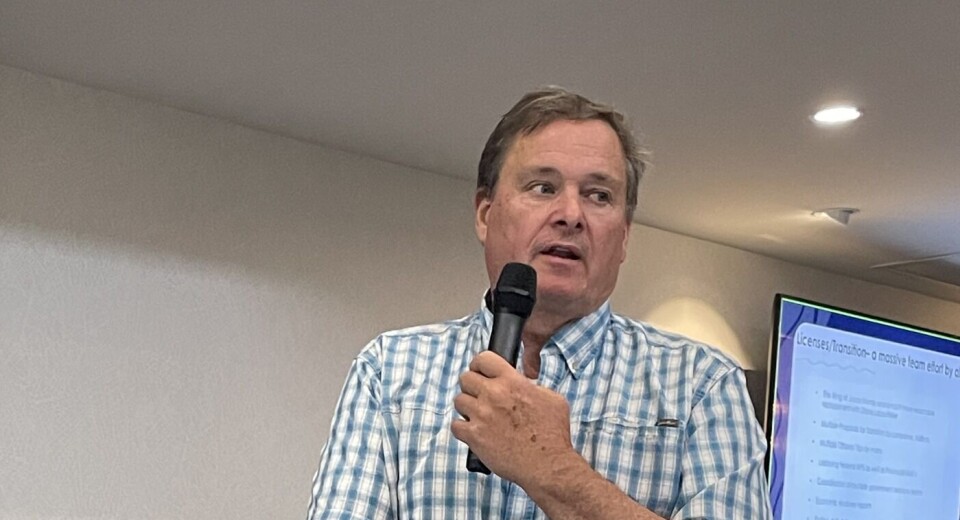
Canada ‘pushing ahead with BC net-pen ban’
Reported move to land-based operations is unrealistic and not supported by science, says salmon sector
Salmon farmers in British Columbia have warned that a reported plan to give the industry five years to move to land-based operations is not realistic and may cost 6,000 jobs.
Canada’s Globe and Mail yesterday quoted unnamed sources who say that the Liberal minority federal government will tomorrow announce its intention to move ahead with its 2019 campaign commitment to put an end to open-net salmon fish farms in coastal BC waters but give the sector five years to adapt.
The exact details, including a transition plan for the operators and fish farm workers, were not shared with the Globe and Mail.
The BC Salmon Farmers’ Association (BCSFA) said in a statement that the plan described in this article does not reflect a “realistic, responsible and achievable” approach to a transition, as fisheries minister Diane Lebouthillier has publicly stated.
Minimal risk to wild fish
“Neither is it supported by science, including that of the government’s own scientists, who have repeatedly stated that salmon farming in BC poses no more than minimal risk to wild Pacific salmon,” said the BCSFA.
“These unsubstantiated claims of a move to land would significantly impact the sector, potentially resulting in the loss of more than 6,000 jobs. This potential decision will also have ripple effects on Atlantic Canada, as it will send a clear message that Canada is not a country in which to invest.
“We have not received any correspondence from the federal government about the licensing decision. Neither the BC Salmon Farmers’ Association nor the Canadian Aquaculture Industry Alliance were contacted for this article.”
A disaster for rural BC
BCSFA executive director Brian Kingzett said: “The idea that 70,000 tonnes of BC salmon can be produced on land in five years is unrealistic and ignores the current capabilities of modern salmon farming technology, as it has not been done successfully to scale anywhere in the world.
“This plan will lead to further increased food prices, heightened food insecurity across North America, and it will be a disaster for rural British Columbia and the First Nations striving to build a future with salmon farms in their traditional territories.”
The BCSFA has previously pointed out that a company establishing a recirculating aquaculture system (RAS) facility for salmon would most likely do so close to large population centres, and not in the remote location on the BC coast where marine farming is currently carried out. Existing sites also lack the huge power supply necessary for a large-scale RAS.
A hybrid RAS/flow-through facility such as the 33,000-tonne farm being developed in Norway by Salmon Evolution - which is looking for a site in North America - would be on the coast, but would take years and millions of dollars to build. The company is primarily focused on phase 2 of its build in Norway, which would take capacity from around 8,000 to 16,000 tonnes.
Resurgence through salmon farming
In a letter published in the Globe and Mail last month, the Coalition of First Nations for Finfish Stewardship (FNFFS) highlighted the importance of salmon farming to its members, and gave the example of one especially remote community, the Kitasoo Xai’xais’.
“For a community of 420 people located 800 km (500 miles) north of Vancouver only accessible by boat or float plane, the Kitasoo Xai’xais’ story is one of resilience and resurgence from the dark times before they engaged in salmon farming. Their Nation went from 5% employment in the Nineties to 99% employment today. They have not had a suicide in 18 years.”
In 2019, the Liberals pledged “to develop a responsible plan to transition from open net pen salmon farming in coastal waters to closed containment systems by 2025” in response to unsubstantiated claims from NGOs and some BC First Nations that lice and disease from salmon farms were impacting on populations of wild Pacific salmon.
Practical alternatives
The BCSFA said the sector, with the backing of First Nations who support salmon farming in their traditional territories, has repeatedly presented practical, realistic, and responsible plans to demonstrate its willingness to invest in technologies that will further reduce any potential risks to wild Pacific salmon without taking the industry out of the sea.
Until yesterday’s Globe and Mail report, Fish Farming Expert understands that it was believed the federal government was broadly supportive of that approach.
Licences for open net pen salmon farms in BC are due to expire on June 30.
“While the federal government has not yet released a decision, we expect one to be released very soon,” said the BCSFA.


























































